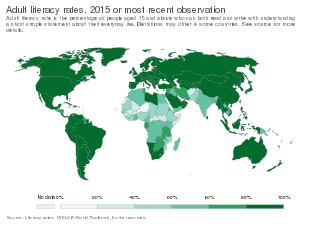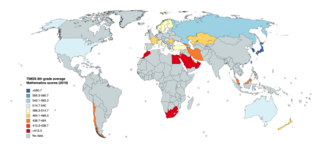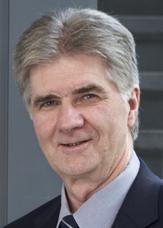
Literacy is the ability to read and write. Broadly, literacy may be viewed as "particular ways of thinking about and doing reading and writing" with the purpose of understanding or expressing thoughts or ideas in written form in some specific context of use. In other words, humans in literate societies have sets of practices for producing and consuming writing, and they also have beliefs about these practices. Reading, in this view, is always reading something for some purpose; writing is always writing something for someone for some purpose. Beliefs about reading and writing and their value for society and for the individual always influence the ways literacy is taught, learned, and practiced.

Education in Australia encompasses the sectors of early childhood education (preschool) and primary education, followed by secondary education, and finally tertiary education, which includes higher education and vocational education. Regulation and funding of education is primarily the responsibility of the States and territories; however, the Australian Government also plays a funding role.

In contemporary education, mathematics education—known in Europe as the didactics or pedagogy of mathematics—is the practice of teaching, learning, and carrying out scholarly research into the transfer of mathematical knowledge.
Education in Scotland is provided in state schools, private schools and by individuals through homeschooling. Mandatory education in Scotland begins for children in Primary 1 (P1) at primary school and ends in Fourth Year (S4) at secondary school. Overall accountability and control of state–education in Scotland rests with the Scottish Government, and is overseen by its executive agency, Education Scotland, with additional responsibility for nursery schools being the joint responsibility of both Education Scotland and the Care Inspectorate. Scotland's private schools are overseen by the Scottish Council of Independent Schools. Children in Scotland sit mandatory National Standardised Assessments in Primary 1 (P1), Primary 4 (P4), Primary 7 (P7) at the end of primary school, and Third Year (S3) in secondary school, which assist in monitoring children's progress and providing diagnostic data information to support teachers' professional judgement.
Education in Japan is managed by the Ministry of Education, Culture, Sports, Science and Technology (MEXT) of Japan. Education is compulsory at the elementary and lower secondary levels. Throughout all levels, the academic year starts in April and ends in March, with two long holidays: summer and winter.

The Programme for International Student Assessment (PISA) is a worldwide study by the Organisation for Economic Co-operation and Development (OECD) in member and non-member nations intended to evaluate educational systems by measuring 15-year-old school pupils' scholastic performance on mathematics, science, and reading. It was first performed in 2000 and then repeated every three years. Its aim is to provide comparable data with a view to enabling countries to improve their education policies and outcomes. It measures problem solving and cognition.
This is an index of education articles.
Malcolm Preston Skilbeck was an Australian educator who worked in educational policy analysis, curriculum, tertiary and secondary education, the teaching profession and educational innovation. Some of this work was done with the Organisation for Economic Co-operation and Development (OECD) and the United Nations Educational, Scientific and Cultural Organization (UNESCO).

The IEA's Trends in International Mathematics and Science Study (TIMSS) is a series of international assessments of the mathematics and science knowledge of students around the world. The participating students come from a diverse set of educational systems in terms of economic development, geographical location, and population size. In each of the participating educational systems, a minimum of 4,000 to 5,000 students is evaluated. Contextual data about the conditions in which participating students learn mathematics and science are collected from the students and their teachers, their principals, and their parents via questionnaires.

Education in Victoria, Australia is supervised by the Department of Education and Training (DET), which is part of the State Government and whose role is to "provide policy and planning advice for the delivery of education". It acts as advisor to two state ministers, that for Education and for Children and Early Childhood Development.

The National Assessment Program – Literacy and Numeracy (NAPLAN) is a series of tests focused on basic skills that are administered to Australian students in year 3, 5, 7 and 9. These standardised tests assess students' reading, writing, language and numeracy and are administered by the Australian Curriculum, Assessment and Reporting Authority (ACARA). The National Assessment Program is overseen by the Education Ministers Meeting.

Andreas Schleicher is a German mathematician, statistician and researcher in the field of education who is currently the director for education and skills, and special adviser on education policy to the secretary-general, at the Organisation for Economic Co-operation and Development (OECD) in Paris.

Patrick Griffin held the Chair of Education (Assessment) at the University of Melbourne and was for 26 years the founding Director of the Assessment Research Centre. He was the Deputy Dean of the Melbourne Graduate School of Education. He has published more than 30 books and more than 240 journal articles government reports on assessment and evaluation topics that include competency development, language proficiency, industrial literacy, school literacy and numeracy profile development, professional standards portfolio assessment and online assessment and calibration.
The Programme for International Student Assessment has had several runs before the most recent one in 2012. The first PISA assessment was carried out in 2000. The results of each period of assessment take about one year and a half to be analysed. First results were published in November 2001. The release of raw data and the publication of technical report and data handbook only took place in spring 2002. The triennial repeats follow a similar schedule; the process of seeing through a single PISA cycle, start-to-finish, always takes over four years. 470,000 15-year-old students representing 65 nations and territories participated in PISA 2009. An additional 50,000 students representing nine nations were tested in 2010.

J. Douglas Willms is the Founder and President of The Learning Bar Inc. He is a member of the US National Academy of Education, Past-President of the International Academy of Education and a Fellow of the Royal Society of Canada. From 1995 to 2018, Willms was Professor of Education at the University of New Brunswick, where for eight years he held the Canadian Institute for Advanced Research Chair in Human Development and for fourteen years held the Tier 1 Canada Research Chair in Literacy and Human Development.
Margaret Wu is an Australian statistician and psychometrician who specialises in educational measurement. She is an honorary professor at the University of Melbourne.

Sustainable Development Goal 4 is about quality education and is among the 17 Sustainable Development Goals established by the United Nations in September 2015. The full title of SDG 4 is "Ensure inclusive and equitable quality education and promote lifelong learning opportunities for all".
Bill Lucas is a social entrepreneur and author. He is a professor of Learning and Director of the Centre for Real-World Learning at the University of Winchester. He is the co-creator of Expansive Education Network and a founding partner of a Bill Lucas Partnership Ltd. He is also an international adviser to Victorian Curriculum and Assessment Authority in Australia and to the OECD/CERI on creativity.
The learning crisis or global learning crisis is a term describing the fact that, despite a large increase in access to schooling, learning outcomes remain poor, especially in developing countries. Worldwide, millions of children who attend school do not acquire basic skills such as literacy and numeracy, and many more are far behind age-appropriate expectations in their national curricula. Proponents argue that this crisis needs to be addressed due to the importance of education in fostering children's development, social mobility, and subsequent opportunities.










